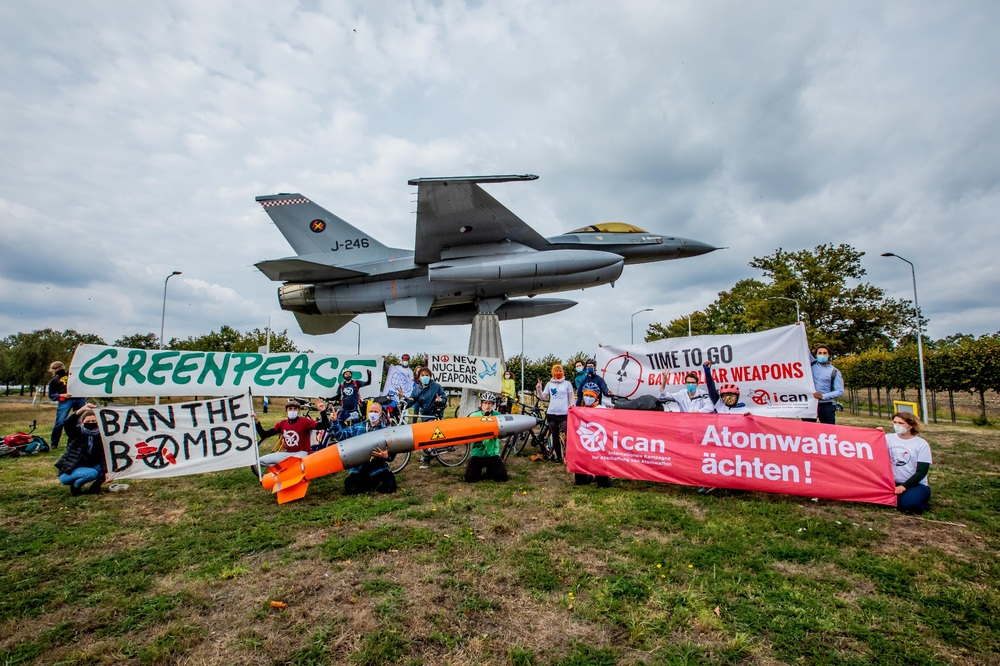A nuclear arms race has terrible consequences. The Netherlands should therefore refrain from storing nuclear weapons in its own country, PAX director Rolien Sasse argues today in Trouw.
Last month President Putin announced that Russia is going to place so-called tactical nuclear weapons in Belarus. Construction of a storage site will be completed on the first of July this year, according to Putin, but it is unclear when the Russian nuclear weapons will be transferred exactly.
This is dangerous and irresponsible. This adds a country with nuclear weapons on its own soil. That is already problematic in times of peace. But now, with war in Ukraine, there is an even greater risk of misinterpretations and accidents. Yet it is hypocritical for the Netherlands to condemn this, as it has the same arrangement with the America.
Volkel houses US nuclear weapons
Putin legitimises his escalation by referring to NATO policy. After all, several NATO countries have US nuclear weapons stationed on their own soil: nuclear sharing. They are, for instance, at the Dutch airbase Volkel. They are also in Belgium, Germany, Italy and Turkey. Putin says he can transfer nuclear weapons to Belarus because the US has transferred them to other countries in Europe. He denies, citing this US practice, that this violates the Non-Proliferation Treaty (NPT).
The NPT came into force over 50 years ago and almost all countries, including the US and Russia, have signed it. The treaty is aimed to stop nuclear proliferation and for disarmament. Articles 1 and 2 of the NPT state that states should neither directly nor indirectly transfer or receive (control over) nuclear weapons. While there is of course no legitimacy for President Putin’s nuclear escalation, it is understandable how NATO’s policy could easily be misused, as Russia is doing now.
In a sense, NATO itself is currently escalating. After all, the US nuclear weapons present in Europe are being modernized, as it is officially called, possibly this year. In fact, new nuclear weapons are being installed, the B61-12, with new capabilities, such as an explosive charge adjustable in power. The bomb can also be more targeted. Moreover, it will be hung under a modern fighter, the F-35, which also has more capabilities than its predecessor, the F-16. For instance, the aircraft is harder to detect by radar. These new capabilities make the weapon more dangerous: they lower the threshold for deployment and may legitimize other states that hold nuclear weapons to arm themselves additionally. We already see the former happening.
Foreign Minister Hoekstra recently spoke about tactical nuclear weapons. During a parliamentary debate, he also stated that the presence of these weapons in the Netherlands is not a violation of the NPT.
Dutch pilots
He argued differently compared to the Russian president. Hoekstra argued that the nuclear weapons were already in the Netherlands before the NPT was signed. He conveniently ignored the fact that new nuclear weapons are coming soon. Besides, it is Dutch pilots who – should they ever be deployed – would have to jettison the nuclear weapons. It is difficult to maintain that in such a case there is no transfer of control of nuclear weapons, contrary to Articles 1 and 2 of the NPT.
A condemnation of the Russian escalation is desperately needed, but therefore difficult for the Netherlands and other NATO countries. If Hoekstra condemns Russia, Putin will immediately reproach him too. It cannot be emphasised enough: any use of nuclear weapons has terrible consequences. There must never be such a war. That is why it is so important to prevent Russian nuclear weapons from going to Belarus. The Netherlands must strongly condemn Putin’s move. This can only be done credibly if the Netherlands no longer accepts US nuclear weapons on its own soil.




